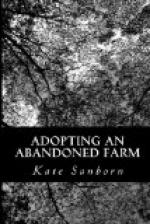The horse looked quiet enough, but I concluded to take my German domestic along for extra safety. I remembered his drawling direction, “Doan’t pull up the reins unless you want him to go pretty lively,” so held the reins rather loosely for a moment only, for this last hope wheeled round the corner as if possessed, and after trotting, then breaking, then darting madly from side to side, started into a full run. I pulled with all my might; Gusta stood up and helped. No avail. On we rushed to sudden death. No one in sight anywhere. With one Herculean effort, bred of the wildest despair, we managed to rein him in at a sharp right angle, and we succeeded in calming his fury, and tied the panting, trembling fiend to a post. Then Gusta mounted guard while I walked home in the heat and dirt, fully half a mile to summon John.
I learned that that horse had never before been driven by a woman. He evidently was not pleased.
Soon the following appeared among the local items of interest in the Gooseville Clarion:
Uriel Snooks, who has been
working in the cheese factory at
Frogville, is now to preside
over chair number four in Baldwin’s
Tonsorial Establishment on
Main Street.
Kate Sanborn is trying another horse.
These bits of information in the papers were a boon to the various reporters, but most annoying to me. The Bungtown Gazetteer announced that “a well-known Boston poetess had purchased the Britton Farm, and was fitting up the old homestead for city boarders!” I couldn’t import a few hens, invest in a new dog, or order a lawn mower, but a full account would grace the next issue of all the weeklies. I sympathized with the old woman who exclaimed in desperation:
“Great Jerusalem, ca’nt I
stir,
Without a-raisin’ some feller’s
fur?”
At last I suspected the itinerant butcher of doing double duty as a reporter, and found that he “was engaged by several editors to pick up bits of news for the press” as he went his daily rounds. “But this,” I exclaimed, “is just what I don’t want and can’t allow. Now if you should drive in here some day and discover me dead, reclining against yonder noble elm, or stark at its base, surrounded by my various pets, don’t allude to it in the most indirect way. I prefer the funeral to be strictly private. Moreover, if I notice another ‘item’ about me, I’ll buy of your rival.” And the trouble ceased.
But the horses! Still they came and went. I used to pay my friend the rubicund surgeon to test some of these highly recommended animals in a short drive with me.
One pronounced absolutely unrivaled was discovered by my wise mentor to be “watch-eyed,” “rat-tailed,” with a swollen gland on the neck, would shy at a stone, stand on hind legs for a train, with various other minor defects. I grew fainthearted, discouraged, cynical, bitter. Was there no horse for me? I became town-talk as “a drefful fussy old maid who didn’t know her own mind, and couldn’t be suited no way.”




